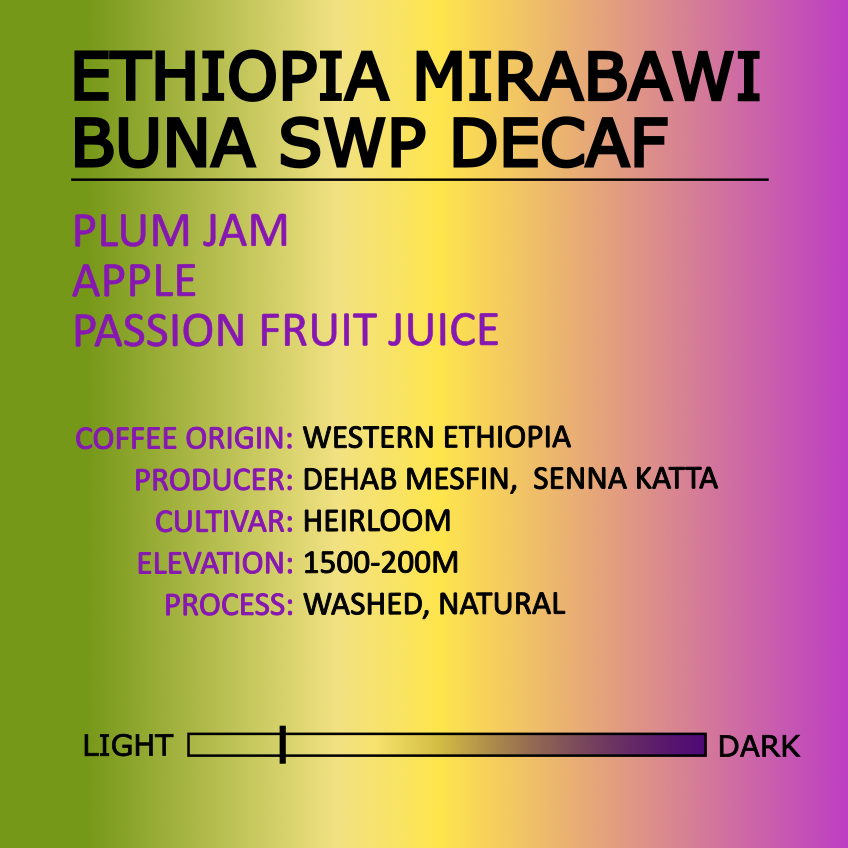Overlook Coffee Co.
Ethiopia Mirabawi Buna SWP Decaf
Ethiopia Mirabawi Buna SWP Decaf
Couldn't load pickup availability
Share

-
Description:
This decaf coffee processed using the Swiss Water method (SWP), showcases a captivating flavor profile that highlights its Ethiopian origins. It opens with delightful sweetness, presenting flavors of simmering berries, plum jam, and crisp apple, with a tropical hint of passion fruit juice. The blend consists of 2/3 naturally processed and 1/3 washed processed coffees, allowing the strong, fruit-forward characteristics of the natural beans to shine through the decaffeination process. Perfect for those seeking a flavorful decaf option, it offers a vibrant, aromatic experience that makes it an ideal companion for any time of day.
-
Product Info:
Variety: Heirloom
Heirloom coffee varieties refer to traditional, often indigenous, cultivars of coffee plants that have been passed down through generations. These varieties are prized for their unique flavors, resilience, and often, their historical and cultural significance. Heirloom coffees are typically grown in specific regions where they have adapted to local climates and soil conditions over time, resulting in distinct flavor profiles that reflect their terroir. They are cherished by coffee enthusiasts and specialty coffee producers for their diversity and potential to offer exceptional taste experiences. Due to their genetic diversity, heirloom varieties also play a crucial role in preserving the genetic heritage of coffee plants, which is important for maintaining resilience against diseases and climate change.Process: Natural/Washed (SWP)
This delicious Ethiopian decaf went through the Swiss Water Process (SWP) in Vancouver, Canada. SWP decaffeinates coffee beans by soaking them in how water to extract caffeine and other soluble compounds, then filtering this “green coffee extract” through a carbon filter to remove the caffeine, leaving behind a caffeine-free liquid that is then used to re-soak fresh beans, effectively drawing out caffeine without removing significant flavor components; this process is entirely chemical-free and relies on precise temperature and time controls to maintain coffee quality. This decaf consisted of 2/3 dry process, 1/3 wet process coffees. It's no secret that all decaffeination processes are hard on coffee and tend to flatten out some of the more nuanced cup flavors. But with the strong fruit-forward natural process coffees, the process merely softens some of those heavy-handed flavors and result in an incredible cup.Elevation: 1500-2000M
Elevation plays a crucial role in determining the quality and flavor profile of coffee beans. Generally, higher elevations are associated with better quality coffee. As coffee plants grow at higher altitudes, they face cooler temperatures, reduced oxygen levels, and increased exposure to sunlight. These conditions cause the coffee cherries to mature more slowly, allowing them to develop more complex flavors and a higher concentration of sugars.Roast: Light/Medium
Light/MediumProfile: Plum Jam,
Apple,
Passion Fruit JuiceA coffee profile, also known as a flavor profile or tasting notes, refers to the unique combination of flavors, aromas, and characteristics present in a particular coffee bean or blend. It encompasses a range of sensory attributes such as acidity, body, sweetness, bitterness, aroma, and aftertaste. Coffee profiles can vary widely depending on factors like the bean's origin, variety, processing method, roast level, and brewing technique.
-

This lot is mostly made up of coffees from Ethiopia's Western Jimma region. The bulk of it is split between two larger scale farms run by Dehab Mesfin, near the Bonga forest in Kafa, and Senna Katta Mountain farm, in Limu's Boter forest reserve.
-
This coffee with its light roast and rich, deep flavor is a remarkable decaf. Very impressive for my first taste of Overlook coffees.
This decaf is the best I’ve ever had. Overlook does an amazing job with their roast. This is a must try!



